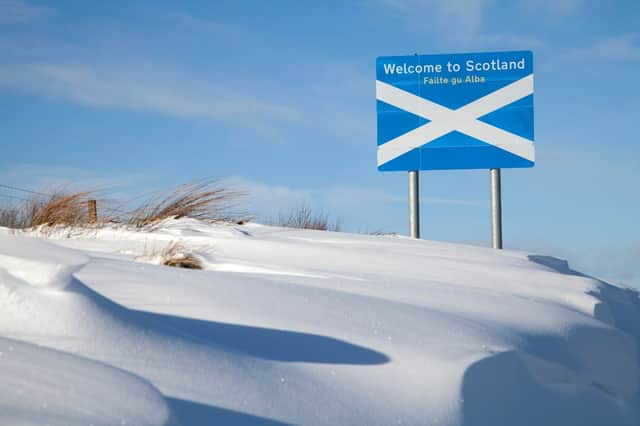Will it snow in Scotland this week? As temperatures plunge there's a chance of a white January for some


We may be past the winter solstice, with the days now lengthening, but there's still some time to go until spring arrives.
That means there will be plenty of chilly days - and weather that's unpredictable even by Scotland's dizzying standards.
Advertisement
Hide AdAdvertisement
Hide AdThe forecasters have warned that a cold snap will hit Scotland this week, so here's what you can expect.
When will it start to get cold?
Temperatures will start to plunge from Friday, January 12, when the first sub-zero conditions will arrive. A small increase on Saturday, January 13, won't last for long, with a sharp drop on Sunday and plunging temperatures lasting for at least a week. The coldest days are likely to be from Wednesday, January 17, to Saturday, January 20.
Just how cold is it going to get?
For the next week temperatures are going to struggle to reach more than a couple of degrees above freezing and much of Scotland is expected to experience temperatures to drop to around -5C in the central belt. Coastal areas may be milder (Aberdeen shouldn't reach less than -3C), but some areas like Stirling could dip to as low as -7C by Thursday.
Will there be snow?
There's a chance of snow across Scotland from Sunday onwards, but the best chances arrive on Tuesday, where there's at least a 50 per cent chance of snow falling.
What has the Met Office said?
Met Office Deputy Chief Meteorologist David Hayter explained: “While the initial snow risk from Sunday onwards is looking most likely to be coastal areas in the north of the UK, including North Sea and Irish Sea coasts, there’s an ongoing likelihood of some disruptive snow through the middle to latter part of next week. What we’re keeping an eye on for this disruptive snow is where exactly this milder air from the southwest bumps into the cold air that will be in place over the UK. It’s where these airmasses meet that there’s a likelihood of some substantial snow for some places. At the moment, models are showing us a variety of options for exactly when and how this situation plays out and it’s something we’ll be able to add more details to in the coming days.”
Are there any weather warnings?
There is currently a yellow weather warning (be prepared) for ice and snow in the north of Scotland on Monday. The weather warning extends to the whole of Scotland for Tuesday, before once again being limited to the north and the west coast on Wednesday and Thursday.
The UK Health Security Agency has also issued a Cold-Health Alert.
Dr Agostinho Sousa, Head of Extreme Events and Health Protection at UKHSA, said: “The temperatures we will see leading into the weekend can rapidly have a serious impact on the health of those over the age of 65 and those with pre-existing health conditions as it increases the risk of heart attacks, strokes and chest infections. It is therefore vital to check in on friends, family and neighbours to ensure they are well prepared for the cold weather next week.”
Will the weather impact drivers?
Advertisement
Hide AdAdvertisement
Hide AdThe RAC have warned drivers to be extra vigilent due to the wintry consitions. Breakdown spokesperson Simon Williams said: “With an increasing risk of snow and ice at the start of next week we urge drivers to make sure they travel fully prepared. Having a few essential items in the boot – no matter what distance you’re going – can make a massive difference in a breakdown situation in freezing conditions. A warm, waterproof coat, sturdy footwear and gloves, along with a blanket and a power bank to keep your phone charged are vital. While no one sets out to breakdown or get stuck in very cold, potentially snowy conditions, there are far too many instances where drivers have underestimated the severity of the conditions and found themselves in danger. It’s far better to prepare for the worse and hope for the best.”
Comments
Want to join the conversation? Please or to comment on this article.